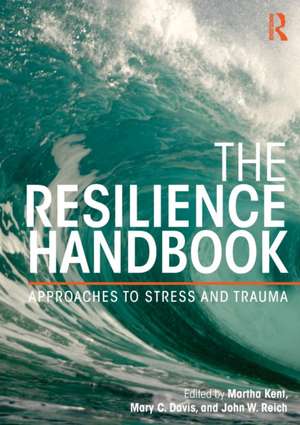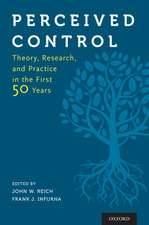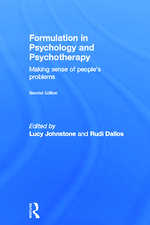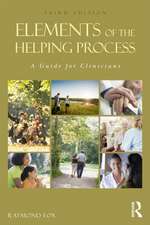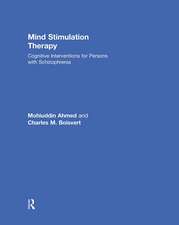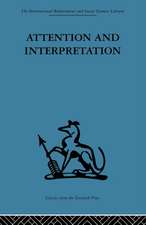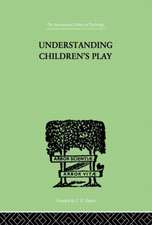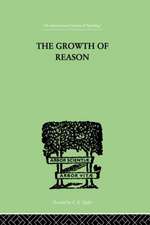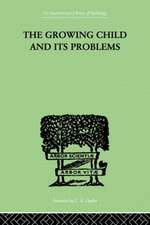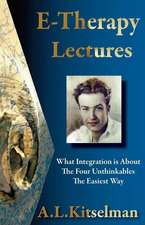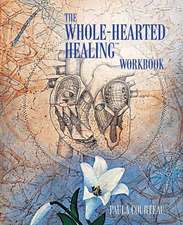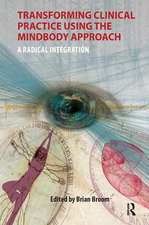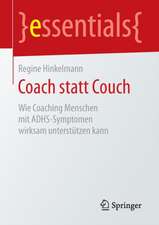The Resilience Handbook: Approaches to Stress and Trauma
Editat de Martha Kent, Mary C. Davis, John W. Reichen Limba Engleză Paperback – 19 aug 2013
This handbook is designed to be used by students as an invitation to a burgeoning field; by researchers, as a framework for advancing theories, hypotheses, and empirical tests of resilience functions; and by clinicians, as a comprehensive and up-to-the-minute integration of theory and practice.
| Toate formatele și edițiile | Preț | Express |
|---|---|---|
| Paperback (1) | 480.30 lei 6-8 săpt. | |
| Taylor & Francis – 19 aug 2013 | 480.30 lei 6-8 săpt. | |
| Hardback (1) | 1612.00 lei 6-8 săpt. | |
| Taylor & Francis – 15 noi 2013 | 1612.00 lei 6-8 săpt. |
Preț: 480.30 lei
Preț vechi: 565.06 lei
-15% Nou
91.90€ • 95.96$ • 76.06£
Carte tipărită la comandă
Livrare economică 04-18 aprilie
Specificații
ISBN-10: 0415818834
Pagini: 344
Ilustrații: 25 black & white illustrations, 7 black & white tables, 4 black & white halftones, 21 black & white line drawings
Dimensiuni: 174 x 246 x 23 mm
Greutate: 0.68 kg
Ediția:New.
Editura: Taylor & Francis
Colecția Routledge
Locul publicării:Oxford, United Kingdom
Public țintă
ProfessionalCuprins
Part I: Resilience as Adaptive Process to Stress and Trauma 1. Seeking and Loss in the Ancestral Genesis of Resilience, Depression, and Addiction Jaak Panksepp 2. The Role of Predictive and Reactive Biobehavioral Programs in Resilience Mattie Tops, Phan Luu, Maarten A. S. Boksem, and Don M. Tucker 3. Approach/Engagement and Withdrawal/Defense as Basic Biobehavioral Adaptations: Resilient Transcendence of a Popular Duality Martha Kent 4. Introduction to Allostasis and Allostatic Load Greta B. Raglan and Jay Schulkin 5. The Automatic Basis of Resilience: Adaptive Regulation of Affect and Cognition Susanne Schwager and Klaus Rothermund 6. The Regulatory Power of Positive Emotion in Stress: A Temporal-Functional Approach Christian E. Waugh 7. Responding to Trauma and Loss: An Emotion Regulation Perspective Matthew Tyler Boden, Madhur Kulkarni, Ashley Shurick, Marcel O. Bonn-Miller, and James J. Gross 8. Music as an Agent of Resilience Donald A. Hodges 9. Oxytocin and Attachment Facilitate a Shift from Seeking Novelty to Recognizing and Preferring Familiarity: The Key to Increasing Resilience? Mattie Tops, Femke T. A. Buisman-Pijlam, and C. Sue Carter 10. Social Touch and Resilience Mary H. Burleson and Mary C. Davis 11. Empathy and Resilience in a Connected World Grit Hein 12. An Attachment Perspective on Resilience to Stress and Trauma Mario Mikulincer and Philip R. Shaver 13. Using the Caregiver System Model to Explain the Resilience-Related Benefits Older Adults Derive from Volunteering Stephanie L. Brown and Morris A. Okun 14. Resilience Is Social, After All Alex J. Zautra 15. Developmental Social Factors as Promoters of Resilience in Childhood and Adolescence Bekh Bradley, Telsie A. Davis, Joanna Kaye, and Aliza Wingo Part II. Resilience Interventions 16. Behavioral Activation as a Treatment for Depression: Theory, Neurobiologic Effects, and Potential Linkages to Resilience Gabriel S. Dichter, Moria Smoski, Roselinde K. Henderson, and Sona Dimidjian 17. Resilience Training for Action and Agency to Stress and Trauma: Becoming the Hero of Your Life Martha Kent and Mary C. Davis 18. Empathy, Individual Characteristics, and Helping Alicia J. Hofelich and Stephanie D. Preston 19. Forgiveness Interventions and the Promotion of Resilience Following Interpersonal Stress and Trauma Nathaniel G. Wade, Heritt R. Tucker, and Marilyn A. Cornish 20. Resilience Interventions with a Focus on Meaning and Values Crystal L. Park and Jeanne M. Slattery 21. The Skills Training in Affective and Interpersonal Regulation (STAIR) Narrative Model: A Treatment Approach to Promote Resilience Christina M. Hassija and Marylene Cloitre 22. Clinical Stimulation of the Oxytocin System: Promoting Resilience after Trauma Jessie L. Frijling, Mirjam van Zuiden, Saskia B. J. Koch, Laura Nawijn, Dick J. Veltman, and Miranda Olff
Notă biografică
Martha Kent is a research scientist at the Phoenix VA Health Care System and a member of the Resilience Solutions Group at Arizona State University.
Mary C. Davis is a professor in the department of psychology at Arizona State University and member of the Resilience Solutions Group.
John W. Reich is an emeritus professor of psychology at Arizona State University and the coeditor of the Handbook of Adult Resilience.
Recenzii
—Anthony Ong, associate professor, department of human development, College of Human Ecology, Cornell University
"A golden thread in the tapestry of mental health: An invaluable and inspiring guide to an important topic destined to play a major role in the future of mental health theory, practice, care and planning and educational policy making."
—Peter Heinl, MD, MRCPsych, author, Splintered Innocence: An Intuitive Approach to Treating War Trauma
"Comprehensive and practical, The Resilience Handbook is an indispensable resource for health-care professionals wanting not only to treat disease, but also to bolster healing, disease prevention, and well-being. This thoughtful and scientifically rigorous collection of essays provides a multidimensional framework for understanding and navigating the many strategies and mechanisms for recovery, even thriving, in the face of adversity."
—Cynthia M. Stonnington, MD, chair, department of psychiatry and psychology, Mayo Clinic in Arizona
"This wonderful book is an absolute must for researchers who are studying resilience, and will do much to advance knowledge and scholarship in the field of resilience research. I am certain that this outstanding book will inspire future generations of resilience researchers and help to inform much-needed resilience know-how across all levels of society."
—Michael Hogan, school of psychology, National University of Ireland, Galway
Descriere
How are people and communities able to prevail despite challenge? What helps them bounce back from adversity and even grow in knowledge and understanding? And can this resilience be taught? During the past decade, exciting scientific advances have shed light on how resilience operates from neurons to neighborhoods. In The Resilience Handbook, experts in the science of resilience draw on human and animal research to describe the process of resilience and follow its course as it unfolds both within individuals and in social networks. Contributors also highlight the promise of new interventions that apply what we know about resilience processes to bolster positive health, and raise some of the pressing questions and issues for the field as it matures.
This handbook is designed to be used by students as an invitation to a burgeoning field; by researchers, as a framework for advancing theories, hypotheses, and empirical tests of resilience functions; and by clinicians, as a comprehensive and up-to-the-minute integration of theory and practice.
